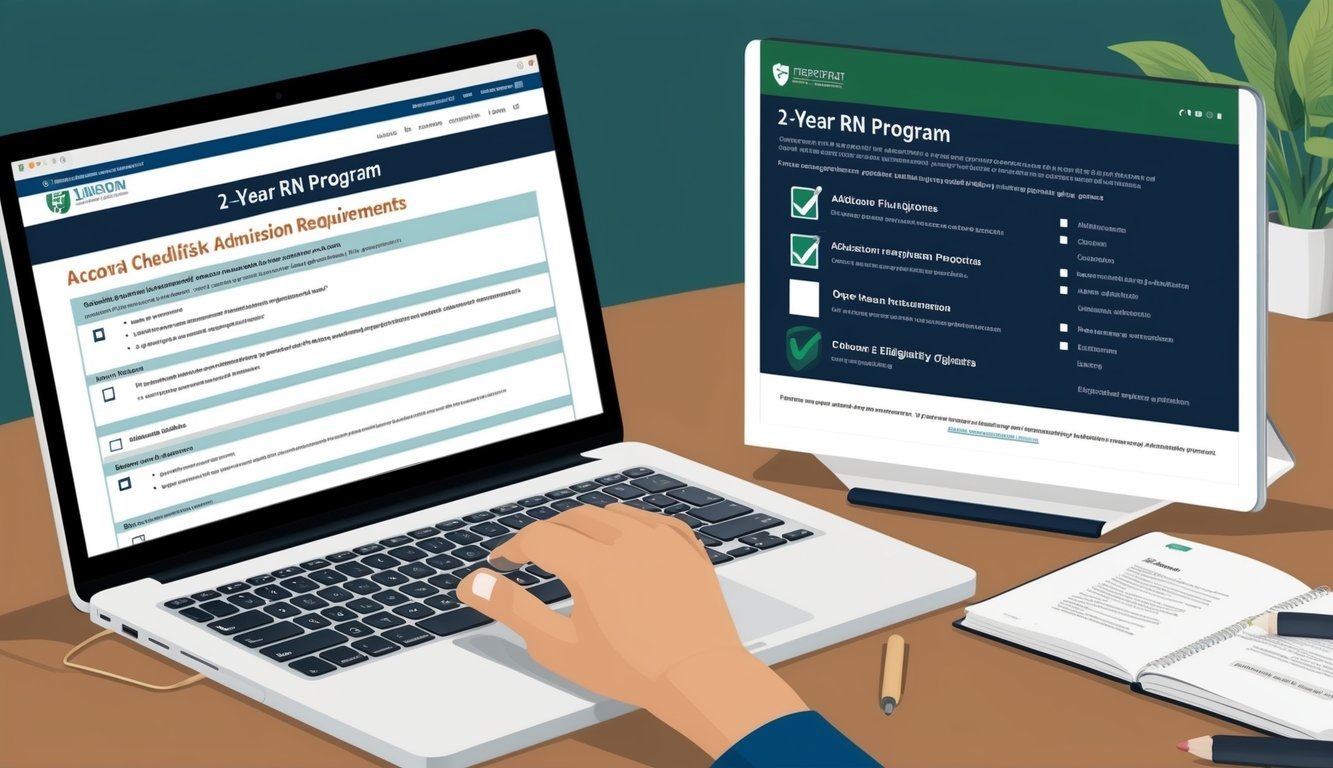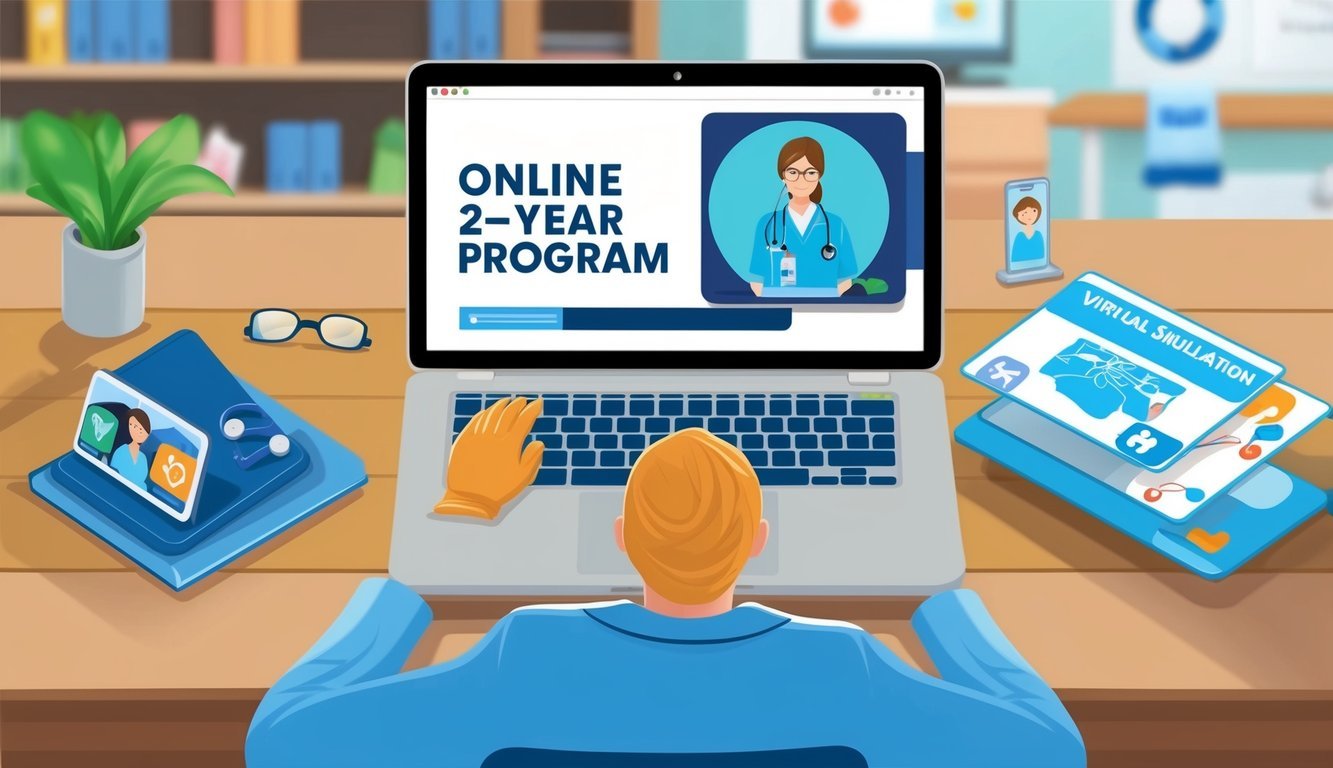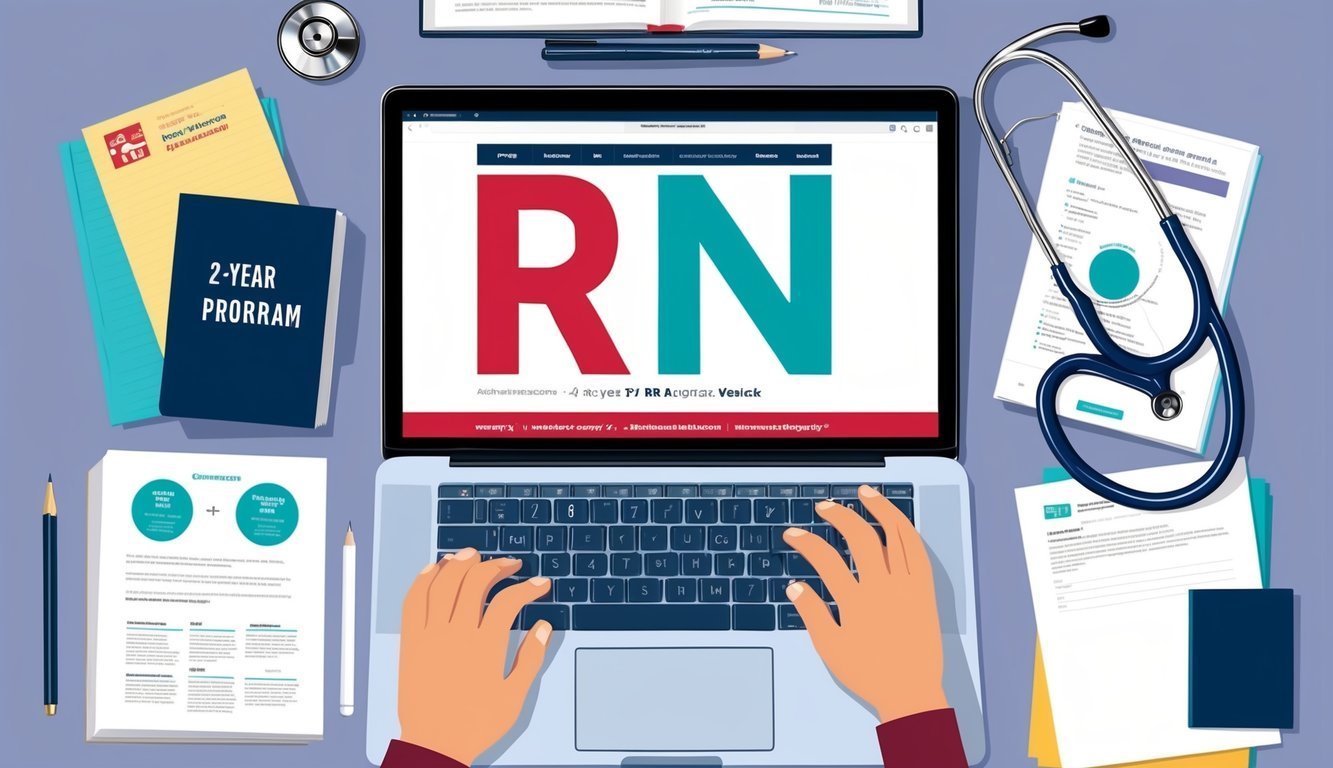In today’s fast-paced world, pursuing a nursing career through 2-year RN programs online offers a flexible and efficient path for aspiring registered nurses.
These programs allow you to earn your Associate Degree in Nursing (ADN) while balancing work and personal commitments.
Many institutions provide comprehensive online education, combining distance learning with essential clinical training to ensure you meet the requirements for licensure.
Enrolling in an online ADN program can help you become a qualified registered nurse in just two years, giving you access to a high-demand job market. With the rising need for healthcare professionals, particularly in underserved areas, this route not only prepares you for a rewarding career but also enables you to contribute significantly to community health.
As you explore your options, consider the various accredited 2-year RN programs online that offer a blend of theory and practical experience.
The convenience of online education allows you to engage with course material at your own pace while preparing for real-world nursing scenarios that you’ll encounter in your future role.
Understanding Online Associate Degree in Nursing (ADN) Programs
Online Associate Degree in Nursing (ADN) programs provide a flexible pathway to becoming a registered nurse (RN).
These programs combine theoretical knowledge with practical skills, often using a hybrid format that includes both online coursework and in-person clinical experiences.
The Structure of ADN Programs
ADN programs typically span two years and include a mix of general education courses and nursing-specific training.
The curriculum encompasses:
- Core Nursing Subjects: These include topics like anatomy, pharmacology, and nursing fundamentals.
- Clinical Experience: You will engage in hands-on training at local healthcare facilities, ensuring you gain essential skills in real-world settings.
Many programs have a structured timeline, usually comprising four consecutive semesters.
Some schools, like Chabot College, boast impressive NCLEX pass rates, highlighting the effectiveness of their training.
Your schedule may vary between fully online courses and hybrid formats, which combine online learning with in-person labs.
This flexibility makes ADN programs accessible to a broader range of students.
Accreditation and Educational Standards
Accreditation is a critical factor when selecting an ADN program.
It ensures that the curriculum meets specific educational standards and prepares you for the NCLEX-RN exam.
Programs accredited by recognized bodies such as the Accreditation Commission for Education in Nursing (ACEN) are generally more credible.
Before enrolling, check the program’s accreditation status.
This can impact your eligibility for financial aid and your acceptance into further nursing education.
A well-accredited program will also provide support in preparing you for the licensing exam, which is essential for becoming an RN.
Additionally, many ADN programs require you to meet prerequisites like a high school diploma or GED.
Placement tests may also be administered to ensure you are ready for the academic challenges ahead.
Eligibility and Admission Requirements

Entering a 2-year RN program online involves specific prerequisites and a structured admission process.
Understanding these criteria can help you prepare effectively for your application and streamline your path to becoming a Registered Nurse.
Prerequisite Courses and Skills
To qualify for a 2-year RN program, you typically need to complete certain prerequisite courses.
These may include:
- Biology: A basic understanding of human anatomy and physiology is crucial for nursing.
- Chemistry: Introduction to chemistry helps you grasp how medications interact within the body.
- Psychology: Courses in psychology enhance your skills in patient care and communication.
In addition to academic prerequisites, many programs expect you to possess basic skills such as critical thinking, effective communication, and empathy.
Some institutions might also recommend taking the Test of Essential Academic Skills (TEAS), which assesses your preparedness for nursing school.
Familiarity with the TEAS and preparing accordingly can be beneficial.
Admission Processes and Criteria
The admission process for 2-year RN programs generally includes several key components:
- Application Form: Complete the application through the program’s website.
- Transcripts: Submit official transcripts from all prior educational institutions.
- TEAS Exam: Many programs require you to achieve a specific score on the TEAS exam, demonstrating competency in reading, math, and science.
Additional requirements may include letters of recommendation, a personal statement, or an interview.
Meeting the criteria set by specific programs is essential, as requirements can vary significantly.
For instance, licensed practical nurses (LPNs) may find accelerated pathways, allowing them to build upon their existing qualifications.
Curriculum and Coursework
In a 2-year RN program, the curriculum is structured to provide you with a comprehensive foundation in nursing.
You will engage in both theoretical knowledge and practical skills essential for patient care.
Core Nursing Courses
Core nursing courses are crucial in your education and typically cover key subjects you must master.
These courses often include:
| Course Title | Focus Areas |
|---|---|
| Anatomy and Physiology | Understanding body systems and functions |
| Health Assessment | Developing skills to assess patient needs |
| Pharmacology | Learning about medications and their uses |
These subjects form the backbone of your nursing education.
You’ll learn to perform health assessments, develop care plans, and understand medication management.
Completing these courses provides the necessary knowledge to ensure safe and effective patient care in various healthcare facilities.
Specialized Clinical Training
Specialized clinical training is a critical component of your RN education.
This hands-on training allows you to apply your classroom knowledge in real-world settings.
During this phase, you can expect to gain:
- Clinical Hours: A specified number of hours in clinical environments.
- Experience in Diverse Settings: Opportunities in hospitals, clinics, and other healthcare facilities.
You will work under the supervision of experienced nurses, gaining insights into patient care practices.
This exposure solidifies your skills in areas such as patient assessments and care management.
Your clinical training serves to bridge the gap between theory and practice, giving you the confidence to succeed in your nursing career.
Practical Experience and Clinical Hours

Practical experience is crucial in nursing education, particularly for 2-year RN programs.
You will partake in both online and on-site clinical training, enabling you to gain hands-on learning and enhance your patient care skills through diverse clinical environments.
Online Versus On-site Clinical Training
Many 2-year RN programs provide a combination of online coursework and on-site clinical training.
While the online component offers flexibility and theoretical knowledge, on-site training is essential for developing practical skills.
Typically, you will complete your clinical experiences in various settings such as:
- Emergency Rooms: Fast-paced environments that refine quick decision-making skills.
- Skilled Nursing Facilities: Focus on long-term patient care and rehabilitation.
- Outpatient Clinics: Experience in primary care and preventive health services.
Clinical hours can vary by program but may range from 50 to 600 hours, depending on the degree requirements.
For students completing an Associate Degree in Nursing (ADN), numerous programs offer structured clinical rotations.
Partnering Healthcare Facilities
Partnerships with healthcare facilities enhance your clinical learning opportunities.
Many 2-year RN programs collaborate with local hospitals, outpatient clinics, and skilled nursing facilities.
These partnerships ensure that you get diverse clinical experiences in real-world settings.
When evaluating programs, consider the following aspects of their partnerships:
- Accredited Facilities: Ensure clinical training occurs in accredited institutions to meet state licensing requirements.
- Clinical Mentorship: Look for programs that provide access to experienced nurses as mentors during your training.
- Geographical Accessibility: Choose a program that partners with facilities within a reasonable distance from your location.
You can find more actionable resources on clinical experiences in nursing through sites like EDsmart and Better Nurse.
Transitioning to the Field as a Registered Nurse

Transitioning to the field as a registered nurse requires thorough preparation and a clear understanding of career pathways.
This section highlights essential steps you must take, including preparing for the NCLEX-RN exam and exploring career prospects.
Preparing for the NCLEX-RN Exam
Passing the NCLEX-RN exam is a critical step in obtaining your RN license.
To prepare effectively, consider the following strategies:
- Study Resources: Utilize review books, online courses, and practice tests tailored for the NCLEX-RN.
- Study Schedule: Create a study plan that allocates focused time for each nursing subject area.
- Group Study: Join or form a study group with peers from your program to gain diverse perspectives.
Many nursing programs also provide NCLEX prep courses.
Incorporating these resources can boost your confidence and ensure you’re well-prepared on exam day.
Career Prospects and Continuing Education
As an RN, you have various career pathways available.
A registered nurse can pursue advanced roles such as a Nurse Practitioner (NP) or continue education with a Master of Science in Nursing (MSN).
Here are some options to consider:
| Career Path | Description |
|---|---|
| Nurse Practitioner | More autonomy in patient care, often requires an MSN. |
| Online RN to BSN | Flexible degree completion to enhance career opportunities. |
| Specialization | Pursue certifications in areas like pediatrics, geriatrics, or critical care. |
Continuing education not only broadens your expertise but can also lead to leadership roles within healthcare settings.
Exploring RN to BSN programs can provide additional qualifications and improve your competitive edge in the job market.
Financial Considerations and Support

Navigating the financial aspects of 2-year RN programs online is crucial for your planning.
Understanding tuition costs, associated fees, and financial aid options can help you make informed decisions about your education.
Tuition and Associated Costs
Tuition costs for online Associate Degree in Nursing (ADN) programs typically range from $10,000 to $30,000 for the entire program, depending on the institution and its resources.
Additional costs may include:
- Textbooks: $1,000 – $2,000
- Clinical fees: $500 – $1,000
- Technology fees: $200 – $500
Considering the program length, most ADN programs can be completed in 24 months.
Therefore, budgeting carefully for these expenses is essential to avoid financial strain as you pursue your nursing career.
For more specific information regarding tuition rates, visit EDsmart’s 2-Year RN Programs.
Financial Aid and Scholarships
Financial aid options can help you alleviate the financial burden of tuition.
The U.S. Department of Education provides opportunities such as:
- Federal Pell Grants: For eligible undergraduate students.
- Federal Direct Loans: To help cover tuition and expenses.
Many schools also offer scholarships specifically for nursing students.
These can range from $1,000 to $5,000 or more, depending on the program and eligibility requirements.
To explore scholarship opportunities, you can visit NextGraduate for resources.
Actively researching financial aid options can significantly reduce your overall cost.
Then, you can focus on your education and future career.

